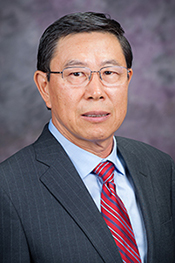Donghai Wang | Professor

Ph.D. - 1997, Texas A&M University
Biological and Agricultural Engineering
M.S. - 1994, University of Illinois at Urbana-Champaign
Biological and Agricultural Engineering
B.S. - 1982, Northeast Agricultural University, China
Agricultural Engineering
Contact information
1048 Seaton Hall
785-532-2919
dwang@k-state.edu
Professional experience
Donghai Wang received a bachelor's degree in agricultural engineering from Northeast Agricultural University, China, in 1982, a master's in biological and agricultural engineering from the University of Illinois at Urbana-Champaign in 1994, and a doctorate in biological and agricultural engineering from Texas A&M University in 1997. He completed postdoctoral training at the USDA-ARS Center for Grains and Animal Health Research from 1998 to 1999. In 2001, Wang joined the Department of Biological and Agricultural Engineering at K-State as an assistant professor. He was promoted to associate professor in 2007 and professor in 2011. Prior to coming to K-State, he worked as an instructor and lecturer at Northeast Agricultural University and a project engineer at Advanced Technologies, Inc.
Research
Wang’s research has focused on bioconversion of renewable materials into biofuels, chemicals and biomaterials including protein adhesives, resins and biodegradable composites; and near-infrared technology for analysis of physical and chemical properties of biomaterials.
Production of biofuels from renewable resources is his major research area. Wang has received approximately $6 million as principal investigator and $22 million as co-principal investigator supported by USDA, DOT, NSF and DOE, among others. Wang and his students conducted fundamental and applied research to overcome some technical barriers for cost-effective production of biofuels from both starch-based feedstocks such as corn, sorghum and millets and cellulosic biomass such as grass, crop residues and woody biomass. Wang has collaborated with materials scientists to develop biodegradable protein-based adhesives and oil-based resins. The major focus on this area is to develop cost-effective technology to separate the proteins and carbohydrates from plant-based materials at high yield and high purity as well as low cost. He is co-director of the Bio Material and Technology Laboratory at K-State. He also conducts research on development of near-infrared spectroscopy models as rapid methods for analysis and characterization of physical and chemical properties of biomaterials. He has established research collaborations with engineers and scientists across the K-State campus and nationwide, and has been involved in several large nationwide research projects.
Academic highlights
Wang has supervised 25 doctoral candidates, 12 master’s students, 13 post-doctoral research associates, and numerous research assistant and visiting scholars. Wang has authored and co-authored more than 250 peer reviewed journal articles, 17 book chapters, more than 190 meeting papers and presentation, and three U.S. patents. His research has been highly recognized nationally and internationally, and one of his research results has been used as new methods for industry. His research has been recognized by several awards including ASABE superior paper award (2011, 2013, 2015), ASABE Rain Bird Engineering Concept of the Year Award (2010, 2016); USDA Certificate of Appreciation Award (2008); Frankenhoff Outstanding Research Award (2009, 2015), Engineering Distinguished Researcher Award (2019), Robert and Becca Reichenberger-Carl and Mary ICE Keystone Teaching Scholar (2019), Distinguished Graduate Faculty Award (2020) at Kansas State University and Applied Energy Journal Award for highly cited research and review paper (2016). He was ranked as a top 2% scientist in biotechnology by Stanford University World Scientist Ranking (2020). Wang has served the professional community as associate editor of the Journal of the ASABE and Applied Engineering in Agriculture. He has also served on several panels and technical committees.